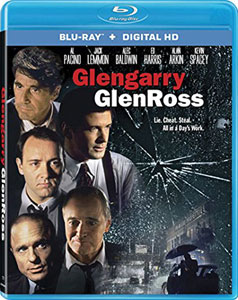“Glengarry Glen Ross” (1992) has an absurdly stacked roster of talent – all men, because only men work at this particular real-estate office, which I suppose was common at the time – and all in service of a searing yet hilarious portrayal of the games these salesmen play to get ahead. Written by David Mamet (from his play) and directed by James Foley, the film features a Jack Lemmon portrayal so iconic that an entire “Simpsons” character, Gil Gunderson, is based on him.
A-list actors bring A-games
These A-list actors all bring their A-games and play off each other as we see the various techniques by which they sell real estate. Perhaps off-screen they are simply selling property to people who want to buy property, but within the film’s deliciously cynical framework, they are essentially tricking people into buying.
The office’s top salesman, Ricky Roma (Al Pacino), befriends a weak-willed fellow (Jonathan Pryce) at a bar before smoothly pulling out a pamphlet he “just happened to have on him.” Even Lemmon’s Shelley “The Machine” Levene, for all his struggles, easily segues into his shtick on the telephone about how he’s only in town for a day and wants to present a steal of a deal.

“Glengarry Glen Ross” (1992)
Director: James Foley
Writer: David Mamet
Stars: Al Pacino, Jack Lemmon, Alec Baldwin
“Glengarry Glen Ross” – so-named for a hot plot of Florida properties that the salesmen would like to get in on – isn’t merely an inside-baseball look at slinging real estate; it has something to say about white-collar jobs in general.
Dave (Ed Harris) and George (Alan Arkin), as they drink at the nearby bar or drive around in the rain, embody the classic tradition of bitching about how the boss makes a dollar and they make a dime. (Meanwhile, Kevin Spacey’s John embodies the icy stereotype of middle management: He’ll do what it takes to protect his job.)
Rapid-fire dialog sells it to us
We nod along in agreement, but are also entertained by – no surprise in a Mamet film – the rapid-fire dialog. Just as the salesmen are in competition to make the most sales (the winner gets a Cadillac, second-place gets a set of steak knives and third place gets fired), the actors are competing for best line delivery.
Alec Baldwin, as corporate mouthpiece Blake, gets that classic line about the office prizes, but I think Harris delivers the best expletive-laden rants and meltdowns. After being interviewed by the police about an overnight break-in at the office, he notes that “the cop couldn’t find his d*** with two hands and a map.” The “F*** you”s he peppers around the office aren’t as clever, but Harris delivers them with panache. Mamet would later write “The Spanish Prisoner” without a single curse word as a challenge to himself, but “Glengarry” has plenty for both films.

As funny as the film is, the stakes for the characters is intense. The company’s strategy of awarding leads (names of potential clients) to whoever closes the most deals seems like a parody of corporate culture, but the fact that Blake is rich (and he’s not even the company’s owner, he’s a high-level exec) and veteran salesman Shelley (the agency’s top seller a few years back) is broke isn’t lost on a viewer.
“Glengarry” is an easy-to-watch snapshot of this workplace – with the added intrigue of the burglary – but it’s also a sharp example of how one party’s immoral (but legal) act can lead to another’s desperate illegal act. Like most of Mamet’s elite work, it’s a tidy and relentlessly entertaining 100-minute statement.

